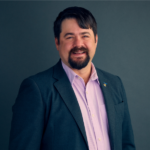Insights
Clyde Deskside: A Conversation with Anthony LaFauce, Managing Director of Clyde Group.

“Our motivation should be creating a sense of societal empowerment. In this way, I see our role as not just communicators, but as agents of social change.”
This is our third edition of Clyde Deskside, where we talk with the people who lead Clyde Group about their professional lives and personal journeys. Our hope is that these conversations can shed some light on how Clyde Group operates as the best agency to work for and the best agency to work with, as well as where the future of the industry is headed.

Managing Director,
Clyde Group
Anthony LaFauce is the Managing Director of Clyde Group, which was named North America’s Best Boutique Agency of the Year by PRovoke in 2021 and 2022. Anthony is a former US Navy sailor and has worked in Public Affairs/Public Relations for 19 years. He has worked with government agencies, virtually all forms of healthcare, consumer product goods, technology companies, trade associations, and his personal favorite, video game companies.
What is your career journey and how did you get to your current role at Clyde Group?
Honestly, it is a pretty odd journey. I joined the Navy when I was 18 because I thought it would be a good way to pay for college. While I was enlisted, I met a Public Affairs officer and had a long discussion with him about his job. After hearing about the type of work he did I decided that was the career path I wanted to take.
I got out of the Navy, went off to college, and with the exception of a small stint at the Pentagon, I have been working at agencies here in D.C. my entire career.
What was the most important lesson you learned along the way?
Make connections with people and help them when you can. Early in my career, I was lucky enough to have a job that pretty much forced me to network. I met hundreds if not thousands of people who, over the years, I have stayed in contact with. Sometimes they ask for help or free advice…you should always give it. People remember when you help them and you don’t need anything from them.
I also take this thinking to my work as an adjunct professor at American University. I spend countless hours connecting my students with potential jobs or internships. Since I have been doing this for 11 or so years now, I have had several past students come back to me and help me when I needed it by providing vital media or client connections, offering to partner on new business, and even coming to work for me directly.
What would you tell your younger self about what you know now?
I can tell you a piece of advice I give to all my students — “get a hobby!” I don’t of course mean an actual hobby but instead have other interests beyond PR. PR people are a dime a dozen and it is a VERY competitive space. By having hobbies, like joining boards or volunteering, you gain experiences and connections your competition doesn’t have. It makes you a better, all-around PR person.
What is your favorite part of working at a PR agency?
I’d say it’s the variety of people you get to work with and clients.
"Make connections with people and help them when you can. Sometimes they ask for help or free advice…you should always give it. People remember when you help them and you don’t need anything from them."
ANTHONY LAFAUCE
MANAGING DIRECTOR
CLYDE GROUP
What advice would you give company leaders who are trying to improve their external communications?
It isn’t about what you say, but what people hear. When I teach, I spend a good deal of time focusing on how every conversation has a speaker and a listener. Communication is the stuff that happens between those two people and you have no clue how your message is landing with your audience. So figure out how your audience wants to be communicated to and then do that. It sounds simple, but I can tell you dozens of ways people get it wrong.
What aspect of the PR/comms industry has changed the most drastically over your career?
Honestly, computers and digital. I learned to code at a very young age on a Commodore 64 and worked on some pretty cool tech when I was in the Navy. I thought when I got into PR that I would never use those skills again but my first job was about the time Google Analytics was becoming a thing. I recall sitting in a room and telling people I could use a computer to tell them how their customers were interacting with their website — it blew their minds.
Years after that, I found myself setting up social listening programs for a major product launch in the US at a time when the term social listening was nowhere to be found — that was incredible too. Today, I teach an entire class at American University on how to use digital tools to become a more effective communicator.
How do you see the PR industry changing over the next five years?
Automation. I know we are in the infancy of these types of programs, but I see AI being used to create images, tell stories, or automate mundane tasks. The future of automation in communications will focus on easily identifying what people say or think online and then finding ways to target them with custom messages. You see this stuff in science fiction but I think we will be there in a few years. Imagine creating custom images and messages based on a person's profile. Fascinating.
What trends in the industry have you seen recently that are most interesting to you?
If it isn’t TOO recent, I’d say it’s the merging of marketing and PR. When I first started, it would have been madness for a PR person to run ads or an ad person to work on messages. As time has gone on, more and more, clients don’t care where these services are coming from as long as they are being done right.
Most overused jargon in PR today?
“Public Relations.” The term itself is narrow by definition and overused. What “type” or PR are you doing today? I think you need to be more specific than just PR.
What do you do for fun in your free time?
Golf, cooking, watching movies, and sleeping. I'm a big fan of sleeping.
What's the best book you've ever read?
“Thank You For Smoking” by Christopher Buckley. Buckley has a whole series of books on communications and public relations. The thing I have always loved about Buckley’s books is that they are all grounded in very real practices. Buckley’s books don’t mystify communications, they actually show how basic many of the things we do are but how they can have massive impacts on the public. If you ever get around to reading “Florence of Arabia,” I can share a story with you of a friend in the Navy who does exactly what that book is talking about.